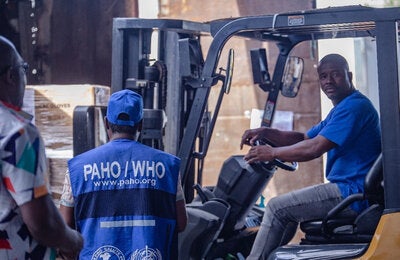Project to provide data on medical products, regulatory processes
Washington, Oct. 6, 2010 - The U.S. Food and Drug Administration today announced the award of a $904,000 cooperative agreement to the Pan American Health Organization (PAHO) to research and develop an information hub for medical products and related regulatory processes and systems in the Americas Region.
The award will help FDA, and all PAHO member states, to better understand other countries' regulatory systems, support capacity to use harmonized standards and guidelines across countries, and prevent, and if necessary respond more quickly to, problems in the medical product supply chain. The "hub" will collect and produce data and map structures and processes in the areas of medical products, including drugs, biologics, vaccines, medical devices and other medical products, and related regulatory processes and systems.
Health ministers of the Americas, at the PAHO Directing Council meeting last week, approved a resolution urging Member States to "strengthen and evaluate their regulatory capabilities" on regulation and oversight for medicines and biologicals. They also asked PAHO's director to "support initiatives for the strengthening and qualification of national regulatory authorities to guarantee the quality, safety, and efficacy of medicines, biologicals and other health technologies."
"National regulatory agencies play a critical role in ensuring access to safe, effective, quality medical products for patients and consumers," said FDA Commissioner Margaret A. Hamburg, M.D. "Improved data access and transfer will help the monitoring of medical products, ingredients, and components throughout the supply chain and help reduce the risk of importing unsafe products and/or their ingredients into the marketplace."
Regulatory agencies in the Americas have different legal and regulatory frameworks, different institutional and administrative structures, different standards and guidelines, and different ways of collecting and analyzing information.
Better collaboration among these agencies will build confidence and knowledge among the participants, stakeholders, and ultimately benefit patients and consumers throughout the region, according to Hamburg.
The cooperative agreement will be administered by the FDA's Office of International Programs, in concert with the agency's relevant product centers. OIP is the focal point of coordination for FDA's global engagement.
According to the Federal Register notice, the agreement will include development of an online database in English and Spanish for a series of countries providing:
- Overview of the regulated sector including description and specific data relating to the medical products and related regulatory processes and systems market;
- Structural overview of the national regulatory process(es) including information relating to national entities participating in the regulatory process;
- Data presented by specific regulatory areas (for example, biologics, vaccines, drugs, medical devices) on processes relating to product registration, licensing (manufacturer, wholesaler and pharmacy/vendor), quality control assessment and postmarketing surveillance;
- Data presented on other regulatory areas such as clinical trials and supply chains;of medical products and related regulatory processes and systems (e.g., including drugs, biologics, vaccines, medical devices, and other medical products as appropriate) per country and/or links to sources where such information is available.
- Data collected and presented in such a way that ensures consistency of terminology, consistency in data collection methods, and robustness, comprehensiveness, and comparability of data.
- The establishment of information exchange mechanisms with the active participation of national regulatory agencies (NRAs) in the region of the Americas that facilitates the process by which the information hub and database is populated with information that is reviewed and maintained in an up-to-date and continual basis.
- A detailed mechanism to maintain and update the hub information is developed detailing the responsibilities of PAHO and its Members States in keeping the data and information contained therein relevant, up-to-date, and comprehensive to encompass the future growth and complexity in the areas of medical products and related regulatory processes and systems.
The agreement also notes that PAHO would work to align or link the information hub with other ongoing global initiatives of the World Health Organization (WHO) or its regional offices in regulatory aspects relating to medical products and related regulatory processes and systems.
Established in 1902, PAHO works to improve the health and the quality of life of people of the Americas and serves as the Regional Office for the Americas of the World Health Organization. PAHO member states today include 38 countries in North, Central and South America, and the Caribbean.
Links:



